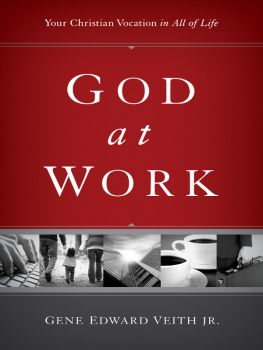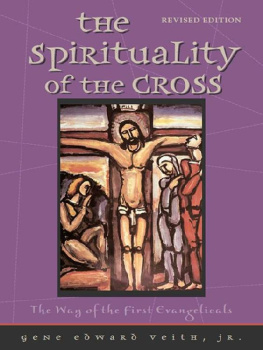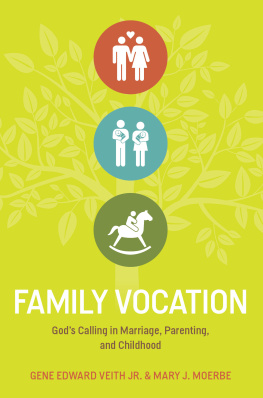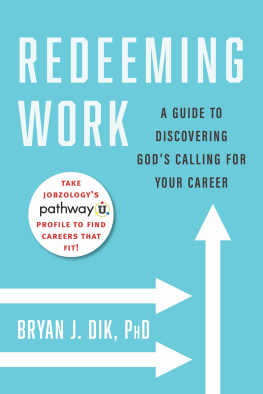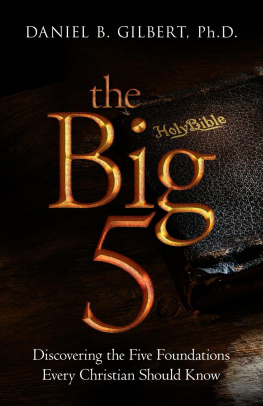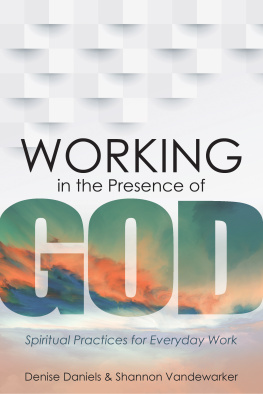God at Work
Focal Point Series
ReViewing the Movies:
A Christian Response to Contemporary Film
by Peter Fraser and Vernon Edwin Neal
Christians in a .com World:
Getting Connected Without Being Consumed
by Gene Edward Veith, Jr. and Chris Stamper
Called to Womanhood:
A Biblical View for Todays World
by Beth Impson
God at Work:
Your Christian Vocation in All of Life
by Gene Edward Veith, Jr.

God at Work
Copyright 2002 by Gene Edward Veith, Jr.
Published by Crossway Books
a publishing ministry of Good News Publishers
1300 Crescent Street
Wheaton, Illinois 60187
All rights reserved. No part of this publication may be reproduced, stored in a retrieval system or transmitted in any form by any means, electronic, mechanical, photocopy, recording, or otherwise, without the prior permission of the publisher, except as provided by USA copyright law.
Unless otherwise indicated, all Scripture quotations are from The Holy Bible, English Standard Version, copyright 2001 by Crossway Bibles, a publishing ministry of Good News Publishers. Used by permission. All rights reserved.
Scriptures marked NIV are from The Holy Bible: New International Version, 1973, 1978, 1984 by International Bible Society. Used by permission of Zondervan Publishing House. All rights reserved.
The NIV and New International Version trademarks are registered in the United States Patent and Trademark Office by International Bible Society. Use of either trademark requires the permission of International Bible Society.
Bible quotations marked KJV are from the King James Version.
Bible quotations marked NKJV are from the New King James Version, copyright 1982 by Thomas Nelson Publishers.
Cover design: David LaPlaca
Cover photo: PhotoDiscTM
First printing, 2002
Printed in the United States of America
Library of Congress Cataloging-in-Publication Data
Veith, Gene Edward, 1951
God at work : your Christian vocation in all of life / Gene Edward Veith, Jr.
p. cm. (Focal point series)
Includes biographical references and indexes.
ISBN 13: 978-1-58134-403-5
ISBN 10: 1-58134-403-1 (alk. paper)
1. VocationLutheran Church. I. Title. II. Series.
BV4740 .V43 2002
248.4dc21 2001007330
VP 18 17 16 15 14 13 12 11 10 09 08
20 19 18 17 16 15 14 13 12 11 10 9 8
To
George Strieter
Contents
CHAPTER ONE
Introduction: The Christians Calling in the World
CHAPTER TWO
How God Works Through Human Beings
CHAPTER THREE
The Purpose of Vocation
CHAPTER FOUR
Finding Your Vocations
CHAPTER FIVE
Your Calling as a Worker
CHAPTER SIX
Your Calling in the Family
CHAPTER SEVEN
Your Calling as a Citizen
CHAPTER EIGHT
Your Calling in the Church
CHAPTER NINE
The Ethics of Vocation
CHAPTER TEN
Bearing the Cross in Vocation
CHAPTER ELEVEN
Conclusion: Resting in Vocation
T his book is dedicated to George Strieter, who first introduced me to the paradigm-shaking implications of the doctrine of vocation. This he did by starting his own publishing company, Ballast Press, to reprint a classic piece of scholarship and theological reflection that, unaccountably, had gone out of print: Gustaf Wingrens Luther on Vocation.
Georges own vocation is that of a roofing contractor, but his voracious reading and his zeal for Lutheran theology led him to start this other enterprise to make this and other spiritual classics available again.
When he gave me his reprint of Wingrens book, it sat on my read-someday pile for months. I had assumed that I knew what the doctrine of vocation was; that, yes, one can do every occupation to the glory of God. I assumed from the unassuming title that this just collected what Luther said on that subject. But both Luther and Wingren said so much more. For Luther, vocation, as with everything else in his theology, is not so much a matter of what we do; rather, it is a matter of what God does in and through us. And Wingren, a twentieth-century Swedish theologian, does more than quote Luther; rather, he systematizes Luthers insights in a sophisticated way and applies them in the context of contemporary thought.
Wingrens Luther on Vocation turned out to be one of those books that opened my eyes to things I had never seen before, helping me see my Christian life in a completely different way. I had a similar sense of illumination when I read C. S. Lewiss Mere Christianity. Keats had it when he first read Chapmans translation of Homer, that sense he describes in his sonnet of staring, astonished, at a previously undiscovered world.
Wingrens book is a complex, specialized theological treatise, somewhat heavy-going for those of us who do not have a theological or pastoral vocation. (It is very much worth reading, though. Order it from Ballast Press at 1-800-335-4672.) My book sets forth what I learned from Wingren and Luther in much simpler (and arguably sometimes oversimplified) terms for laypeople like myself. After all, it is we laypeople who most need to understand the nature of our callings in the world.
The debt this book owes to Wingren is obvious and hereby acknowledged. But just as the Pacific Ocean existed before the conquistadors in Keatss poem discovered it, the doctrine of vocation has been an important part of Reformation spirituality for centuries. In studying this concept further, I was helped not only by other writings on the subject but by a number of pastors who have been teaching these truths to their flocks throughout their ministries. I should mention particularly Rev. John Pless, Rev. Mark Sell, and Rev. Steven Hein, whose insights have helped me sharpen my understanding of this doctrine.
In the meantime, the place where I have been called to teach, Concordia University-Wisconsin, whose visionary President Dr. Patrick Ferry is strongly committed to the doctrine of vocation, instituted the Cranach Institute, named after Luthers friend the artist, to study, apply, and promote the idea of vocation. As its director, I want to acknowledge the board members, pastors, and laypeople who get the idea and who have helped me greatly in this venture: George Strieter (again), Bruce Gee, Ilona Kuchta, Rev. Todd Peperkorn, and Rev. David Speers (who, I understand, introduced George to Wingrens book).
Thanks too to those I am privileged to know so well in my vocation within the family: My wife Jackquelyn and my now grown children, Paul, Joanna, and Mary, whose own vocational struggles greatly helped me to think through these issues as they apply in the real world.
CHAPTER ONE
Introduction:
The Christians Calling in the World
W hen we pray the Lords Prayer, observed Luther, we ask God to give us this day our daily bread. And He does give us our daily bread. He does it by means of the farmer who planted and harvested the grain, the baker who made the flour into bread, the person who prepared our meal. We might today add the truck drivers who hauled the produce, the factory workers in the food processing plant, the warehouse men, the wholesale distributors, the stock boys, the lady at the checkout counter. Also playing their part are the bankers, futures investors, advertisers, lawyers, agricultural scientists, mechanical engineers, and every other player in the nations economic system. All of these were instrumental in enabling you to eat your morning bagel.
Before you ate, you probably gave thanks to God for your food, as is fitting. He is caring for your physical needs, as with every other kind of need you have, preserving your life through His gifts. He provides food for those who fear him (Psalm 111:5); also to those who do not fear Him, to all flesh (136:25). And He does so by using other human beings. It is still God who is responsible for giving us our daily bread. Though He could give it to us directly, by a miraculous provision, as He once did for the children of Israel when He fed them daily with manna, God has chosen to work through human beings, who, in their different capacities and according to their different talents, serve each other. This is the doctrine of vocation.
Next page
